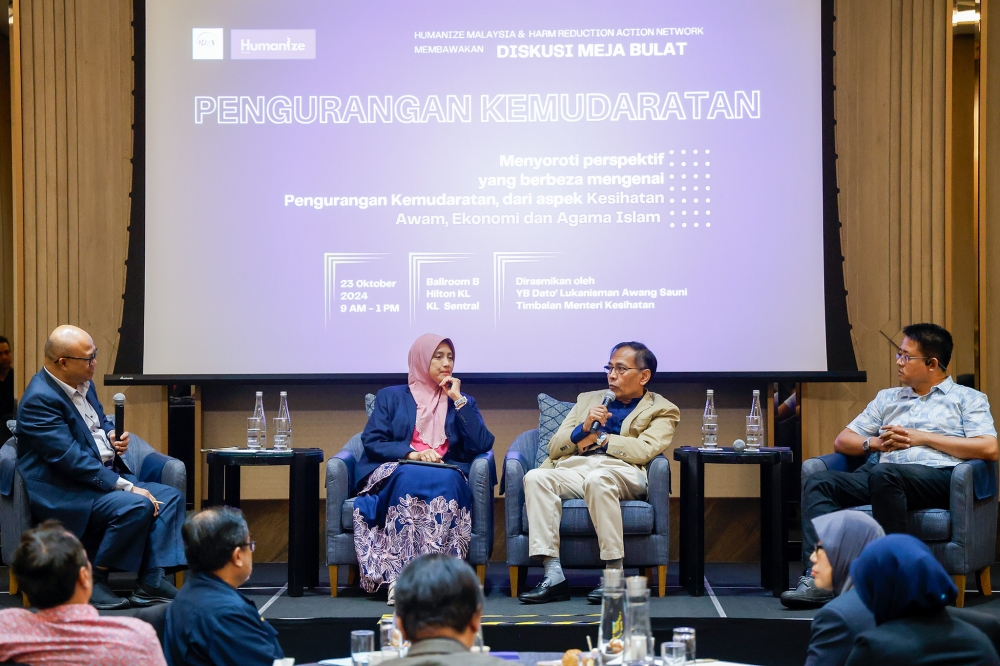
How are bias, religious background and prejudice affecting HIV harm reduction in Malaysia? Doctors relate their experience

(L-R) Consultant clinical psychologist Azlina Mohamad Ghaffar, assistant professor at International Islamic University Dr Ummu Afeera Zainulabid, Islamic Medical Association Malaysia coordinator of Islamic medical ethics, Dr Ahmad Faidhi Mohd Zaini, and Institut Kefahaman Islam Malaysia research director Dr Shaikh Mohd Saifuddeen Salleh at a roundtable on harm reduction. Oct 23, 2024. — Picture by Firdaus Latif
Wednesday, 23 Oct 2024 6:20 PM MYT
Wednesday, 23 Oct 2024 6:20 PM MYT
- Several urged for increased education and awareness among healthcare providers to reduce stigma when treating HIV patients in Malaysia.
- They highlighted how prejudice among medical professionals compromises patient care and public health efforts, particularly in harm reduction.
- The discussion also addressed the challenges faced by doctors prescribing HIV prevention treatments, with misconceptions about enabling risky behaviour.
KUALA LUMPUR, Oct 23 — Medical doctors in a forum today called for greater awareness and education among healthcare providers when dealing with HIV patients and those who are at risk of getting infected.
Speaking at a panel session on Islamic perspectives in harm reduction, the doctors warned that persistent stigma among medical professionals compromises both individual patient care and broader public health efforts.
“We need to understand the perspective in Malaysia, because we have our socio-culture. So that is why this also shapes the view of Muslim medical workers in Malaysia.
“So that is why I feel it is important that you educate,” Dr Ummu, an assistant professor at the International Islamic University Malaysia, told the roundtable, referring to prejudice among healthcare workers.
Islamic Medical Association Malaysian's medical jurisprudence coordinator, Dr Ahmad Faidhi Mohd Zaini pointed to his experience teaching fellow medical practitioners how to address their own biases and misconceptions during the Covid-19 immunisation drive.
“I feel the same is happening in the harm reduction policy. So it cannot be denied that we have to also train our frontliners,” he said.
The duo were speaking in civil groups Humanize Malaysia and Harm Reduction Action Network's (HRAN) discussion on harm reduction strategies and policies in Malaysia, launched by Deputy Health Minister Lukanisman Awang Sauni.

(L-R) Harm Reduction Action Network (HRAN) deputy president Datuk Dr Sha'ari Ngadiman, HRAN president Dr Anita Suleiman, advisor to University of Malaya Centre for Addiction Science Studies (UMCAS) Prof Dr Mohamad Hussain Habil, and UMCAS director Prof Dr Rusdi Abdul Rashid during a panel discussion on harm reduction. Oct 23, 2024. — Picture by Firdaus Latif
In addition, HRAN's president Dr Anita Suleiman said that parents, teachers, and the society all share responsibility to prevent the infection of HIV/AIDS, and doctors have to pick up the slack of reducing harm for those who are already participating in high-risk behaviours.
During her panel session, Dr Anita highlighted the stigma faced by doctors who prescribe pre-exposure prophylaxis (PrEP) for HIV prevention — such as unfair accusations of enabling risky behaviour by encouraging unsafe sexual practices.
“It is not that we are encouraging them to engage in unnatural and immoral activities. It is for them to protect themselves,” the infectious disease control expert said, adding that it is impractical to just call for abstinence.
The human immunodeficiency virus (HIV) attacks the body's immune system but can be effectively managed with modern medical treatment.
If left untreated, HIV can progress to acquired immunodeficiency syndrome (AIDS), a severe condition that compromises the body's ability to fight infections.
HIV transmission occurs through unprotected sexual intercourse, blood transmission, contaminated needles, and from mother to child during pregnancy, delivery or breastfeeding.
In addition, HRAN's president Dr Anita Suleiman said that parents, teachers, and the society all share responsibility to prevent the infection of HIV/AIDS, and doctors have to pick up the slack of reducing harm for those who are already participating in high-risk behaviours.
During her panel session, Dr Anita highlighted the stigma faced by doctors who prescribe pre-exposure prophylaxis (PrEP) for HIV prevention — such as unfair accusations of enabling risky behaviour by encouraging unsafe sexual practices.
“It is not that we are encouraging them to engage in unnatural and immoral activities. It is for them to protect themselves,” the infectious disease control expert said, adding that it is impractical to just call for abstinence.
The human immunodeficiency virus (HIV) attacks the body's immune system but can be effectively managed with modern medical treatment.
If left untreated, HIV can progress to acquired immunodeficiency syndrome (AIDS), a severe condition that compromises the body's ability to fight infections.
HIV transmission occurs through unprotected sexual intercourse, blood transmission, contaminated needles, and from mother to child during pregnancy, delivery or breastfeeding.
No comments:
Post a Comment